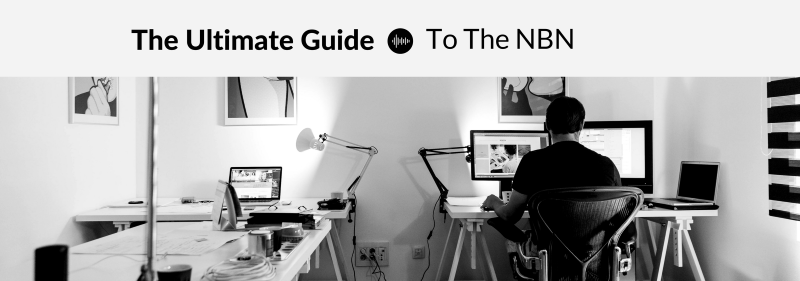- What is the NBN?
- How fast is the NBN?
- What are the types of NBN connections?

The NBN is everywhere and TV commercials and giant billboards remind us that most of the country relies on the NBN for broadband Internet.
Ever wondered what the NBN is or how fast it is? If you have questions about what the NBN means for you and your family, this article is a must-read. So, grab a cuppa, get comfy, and let's dive in.
What is the NBN?
The NBN, or National Broadband Network, is a government-owned initiative aiming to provide Australians with reliable and fast broadband, no matter where they are. It uses fibre-optic, fixed wireless, and satellite infrastructure to replace old broadband systems with faster and more dependable services for homes and businesses across the country.
The goal was to "future-proof" Australian homes and businesses, upgrading outdated infrastructure for stronger, faster connections. This is particularly important in geographically isolated areas, where Internet access is crucial for both work and personal life.
So, how fast is the NBN?
When it comes to broadband speeds, the NBN offers users a variety of speed options, ensuring that everyone has access to its services at any budget. At the very least, NBN users have the option to choose the speed tier that works for their household.
The most popular NBN tier is the NBN 50. It’s an affordable option that offers decent download speeds for users across a range of settings and it’s the ‘middle ground’ for those looking to stream and surf without too much of a lag. Here’s a breakdown of all the NBN speed options available:
12Mbps
Best for: People living alone or for couples.
The first tier, which advertises download speeds of 12Mbps, is designed as a match for older ADSL2+ speeds. 12Mbps plans are the cheapest available and is the current bare minimum - certainly not fast enough for streaming high definition videos.
25Mbps
Best for: Watching TV/general Internet browsing
This Tier 2 connection provides 25Mbps, which is a good amount of bandwidth for smaller households who have standard Internet usage.
50Mbps
Best for: Larger families who want to stream from more than one device
This speed connection is one of the most common connections available. 50Mbps speeds are great for families who may want to stream music and movies all at the same time on their own devices at home without a suffering download speed.
100Mbps
Best for: Gamers, busy Internet users, those who work from home.
One of the fastest speeds available today and the best way to future-proof your connection is a plan in the 100Mbps speed tier. This speed option is best for large families or share homes that will be able to make use of the capacity of this connection speed.
It is also a fantastic choice for businesses, as these connections offer between 17-40Mbps upload speeds, fantastic for backing up business systems or sharing large files with colleagues.
250Mbps
Best for: Businesses, heavy gamers, multiple devices
The 250Mbps connection speed is for the home that has multiple devices streaming video and gaming all at once. This plan also provides a good amount of bandwidth for businesses that want to make use of cloud-based storage.
1000Mbps
Best for: Up/downloading large files, running a home office, streaming multiple high-definition videos
Finally, we have the top tier option with 1000Mbps download speeds. If you are looking to future-proof your home or business and have the budget for it, then this is the speed tier you want. This connection can provide up to 100Mbps upload speeds which is great for uploading large files or backing up your system to the cloud.
What are the types of NBN connections?
When exploring the NBN connection options, we encounter four main types. First on the list is the Fibre To The Premises/Home (FTTP/H) connection. Initially, the government planned to extend fibre optic cabling directly to homes and businesses. This type is known as Fibre To The Premises/Home (FTTP/H).
Next, we have the Fibre To The Node (FTTN) connection, introduced mid-way through the NBN rollout due to funding constraints. FTTN combines existing copper systems with fiber optics, connecting a local node/cabinet to properties via existing copper lines.
Another option is Fixed Wireless connections, suitable for remote locations where physically connecting to the fibre-optic network is impractical. This setup involves a local tower connected to the NBN with fibre optic cables, and properties have external antennas for wireless connectivity. However, standalone VoIP home phone service is not supported, requiring bundling with Internet plans.
Lastly, there’s Fibre To The Curb (FTTC). This connection uses fibre optic cabling from the exchange to a telecom pit outside the property, with a shorter stretch of copper cabling between the pit and the property.
To get an FTTP upgrade, homes and businesses with FTTC or FTTN connections should have an NBN plan with a minimum download speed of 100Mbps. The latest round of suburbs and towns eligible includes one million properties and up to 58% in regional areas. The government has invested $2.4 billion towards the full fibre rollout.
Popular NBN plans
Contact Compare Broadband to get connected
For those who still have queries or questions, do not hesitate to head over to our website or contact us today. We are here to help you, and help we will.







